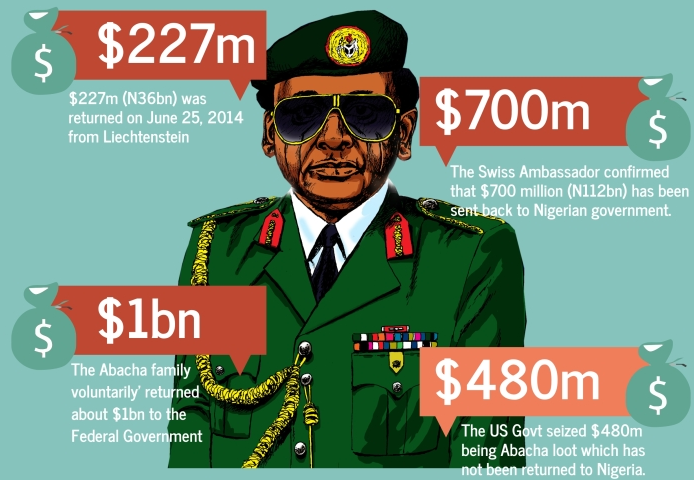Finance
$22.2m Abacha Loot Spent on Empowerment Schemes –FG

- $22.2m Abacha Loot Spent on Empowerment Schemes –FG
The Federal Government on Thursday said that it had spent $22.216m out of the $322m recovered loot from the late Head of State, Sani Abacha, on various empowerment schemes.
The spending, according to the government, is part of the strategic efforts to lift millions of Nigerians out of poverty.
It also rejected the recent report of the World Poverty Clock, which identified Nigeria as the poverty capital of the world as 91.6 million of its about 200 million population are now extremely poor.
The government, while faulting the report, said the data and parameters used by the rating body were 2012 figures and occurrences; noting that the indicators did not reflect current economic realities as captured by the National Bureau of Statistics.
Speaking in Abuja while giving an account of the National Social Investment Programme of the administration of President Muhammadu Buhari, the Senior Special Adviser to the President on Social Investments, Maryam Uwais, noted that the disbursement of Abacha loot commenced in 2018.
She explained that the Social Investment Programmes were anchored on four broad pillars which were the N-Power, Conditional Cash Transfers, National Home-Grown School Feeding and Government Enterprise and Empowerment Programmes.
On the implementation of the N-Power programme, Uwais said 500,000 people spread across 774 Local Government Areas had been recruited to teach in public schools, act as health workers in primary health centres and as agriculture extension advisors to smallholder farmers in various communities.
On the National Home-Grown School Feeding Programme, Uwais said, “Nigeria is fast on its way to becoming the leader in Africa in NGHSFP by feeding over 9.7 million pupils and still counting.”
To implement the programme, she said the government required 94 metric tons of fish, 7,260,862 eggs and 767 cattle slaughtered for the pupils being fed.
With regards to the Conditional Cash Transfer Programme, she said it was designed to deliver timely and accessible cash transfers to beneficiary households, as well as build their capacities for sustainable livelihoods, through a meticulous selection process.
On the Government Enterprise and Empowerment Programme, Uwais explained that the initiative sought to provide collateral and interest-free financial support to businesses at the bottom of the financial pyramid.
She added that funds for the programme were managed by the Bank of Industry.
She said the BoI had since made 1,681,491 loans available to successful applicants in all the states and the FCT.